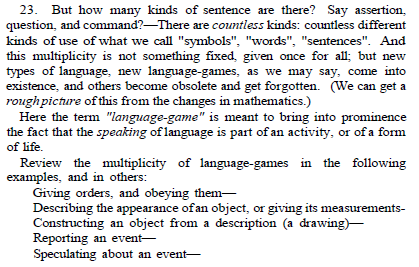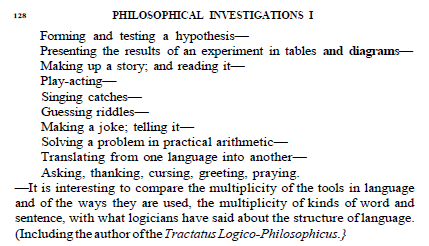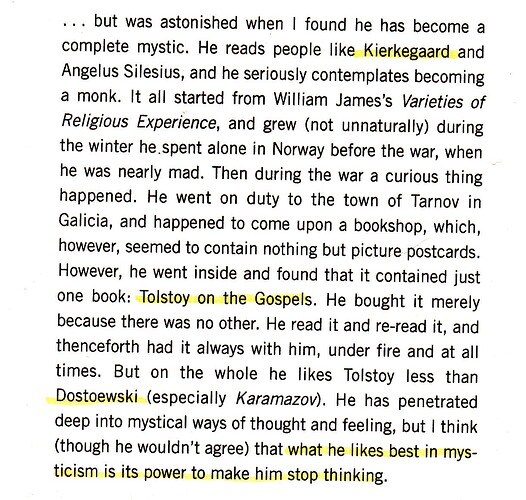Well said, and there were a couple things in there about the worship of God that I hoped to see you say. God willing, I will to come back and highlight where we are in agreement. Which seems to be everything you wrote as I didn’t find anything that I disagreed with.
I would also emphasize that anytime someone is brought into more heartfelt worship, as is what apparently-obviously happened at Asbury, it’s a good thing, the most important, whether it has a measurably enduring outcome or not.
Ok. Your turn. How does all of this revival discussion related to the Meaning of Life as you see it?
Thank you for reminding me about this. You had mentioned it before and it slipped my mind. Very relevant to understanding your perspective
I recalled this from Jimmy Lin’s interview that I think is relevant:
“But there were events that helped me when I was very young in my faith and needed that sort of, that help, that God really sort of spoke to me in that way of, again, through different ways of illness or again, things that are improbable that happened in a very improbable way.”
God making himself known in small or big ways is key to understanding our meaning. It can be very different from one person to the next, as Lin’s calling makes clear, but the underlying thing is: “So, whether you eat or drink, or whatever you do, do all to the glory of God.”
The scans are from my copy of Wittgenstein: A Religious Point of View? The Wittgenstein quotes labelled VB are from Culture & Value and the one labelled R is from Wittgenstein’s correspondence with Rush Rhees.
Tru dat.
I think you’re on the right track. Prayer isn’t (or shouldn’t be) asking God for wish fulfillment. There’s also meditative and contemplative prayer, just in the Christian tradition. On the last statement, to believe in God is to see meaning in all things, but I’m pretty sure Wittgenstein was thinking of Tolstoy. Tolstoy converted to Christianity late in life after a long bout with depression and “meaninglessness.” You reminded me of a letter that Bertrand Russell wrote to his mistress after meeting with Wittgenstein in 1919 so he could explain the Tractatus line-by-line.
Tolstoy on the gospels = The Gospel in Brief.
Wittgenstein is channeling Kierkegaard in all those quotes.
Much about life - what. we are and what we experience does seem miraculous, which isn’t identical to being a trademarked good of the Christian brand. That there should be anything instead of nothing is already wondrous
I don’t think “certainty” is a good match for “faith”. I prefer “allegiance”, what it is I rely on when my speculative intelligence is unable to deliver anything certain.
Perhaps the certainty that is required is the recognition that nothing of the kind is obtainable by way of our speculative intelligence. Maybe we who are cerebrally inclined just need to get clear that the truth we seek to orient our lives toward can not be vouchsafed that way. Cognitive assent isn’t the issue, it isn’t up to us in any arbitrary way. Frankly I think it is the weight of propositional/doctrinal specificity which the Christian package contains which makes it so difficult to square with our speculative intelligence which has so often proven useful in other contexts. I would think it would help to differentiate between the general orientation and the specificity of doctrine, admitting that what is or can be recorded in fine detail is more tentative and open to interpretation. I guess, but anything I can say about it from the outside is admittedly of limited use.
Huh, looks like we’ve arrived at a similar conclusion. How about that?
I was unaware of his brush with Christianity. Do you happen to know what his earlier experience with the church would have been like as a child, his family and so on?
Having read through the Tractatus as a naive first semester student in a philosophic methods class expecting to find something remarkable I found instead that it was hollow and worthless, as he also came to believe apparently. It basically reads as a manual for simulating human thinking without the messiness of embodiment. If it was his propensity for this kind of driven thinking that resulted in the Tractatus then I can see why any path to short circuit that would have been welcomed. Honestly I don’t think anything supernatural is required, that is jumping the gun to steer the result in the direction some start out desiring. All that is needed is the recognition that there is something more that is immediate in our experience which can inform and contribute to our lives if we don’t short circuit it with our overactive cognitive interventions.
One final question if I may, do you know where Philosophic Methods comes in. I’m guessing it must be after the mystical phase but I’m not sure.
Oh my gosh. Wittgenstein lived one of the great lives of the 20th century. If your library carries it, Ray Monk’s biography The Duty of Genius is well worth your time. To give you a sense of his early life, the first chapter is titled “The Laboratory of Self-destruction.” (Two of Ludwig’s brothers committed suicide.)
I’ll try to summarize. Ludwig was the youngest of eight children. Ludwig’s father was an anti-Semite of Jewish descent and one of the wealthiest men in Europe. His mother was Catholic, and they both converted to nominal Protestantism. Brahms was the family’s piano teacher. His brother Paul was a concert pianist who lost his right arm in the Great War. He resumed his career and Ravel wrote Piano Concerto for Left Hand Alone in Paul’s honor. Gustav Klimt painted his older sister’s wedding portrait. The Freuds were part of their Vienna social circle. Ludwig didn’t have the musical talent of his older siblings and was sent to a local private school where Hitler was one of his classmates.
That doesn’t even get to the good stuff. He enlists in the Austrian army as an artillery spotter behind enemy lines (death sentence), is captured and finishes the Tractatus in POW camp, quits philosophy, gives away his inheritance, and becomes an elementary school teacher in rural Austria. (He resigns immediately when he strikes a girl in frustration, an incident that would haunt him the rest of his life.) When he’s lured back to Cambridge to teach, he repudiates his former philosophy and starts over. When WWII breaks out, he volunteers as an orderly in a hospital. What a life.
I’ll look for it. Thanks for the meaty teaser.
Addendum: I forgot to reply to your last question.
Interesting tidbit: Tractatus was the only thing published during Wittgenstein’s lifetime. Philosophical Investigations was published posthumously, since Wittgenstein never stopped fiddling with it, and everything else was either bootleg early lecture notes (the so-called Blue and Brown books) or collections of notes gathered from his notebooks by his literary executors (Culture & Value among them). He’s sort of like Pascal (Pensees) in that respect.
This is how Wittgenstein described his previous attempt to reduce all sentences to propositions and thus describe the underlying “logic” of language:


How to catch up on this rush of Wittgenstein, Johnson, Delepine, West and Russell?! All in one afternoon. Amazing. It’s just not going to be possible. I’ll try to focus on Meaning of Life issues. [In hindsight, I recognize I failed to focus.]
Good Lord! if the only parts of life that had any meaning were the parts we “got right” we’d have very little we could value. No. I think of much more value is what we do with the parts we end up deeming “mistakes” or “wrong choices” or “dead ends.” Scott, my husband, often says “Perfect is the enemy of done.” You-know-who (somewhere) said: “Life can only be understood backwards; but it must be lived forwards.”
We can’t possibly get it right all the time.
Thanks, Jay. I was going to ask for references, too. Although the books multiply exponential at my house, while I read barely arithmatically.
My branch of the organized doesn’t really touch these. There’s lot to learn. And I think for Christians these types of prayer could be very helpful in understanding meaning. Requires sitting still, though, I think.
However, Russell’s comments on Wittgenstein are priceless. Obnoxious, but priceless nonetheless.
what he likes best in mysticism is its power to make him stop thinking.
If there is a mystical bone in my body, I haven’t found it yet. So, the meditative and contemplative prayer sound both appealing and incomprehensible at the same time. @LM77 and I were comparing our lifelong memberships among the Frozen Chosen the other day. Somehow, we’re there, communing with the Lord, but no one else would ever know it. Well, we do sing, but nondemonstratively. Now that we don’t have hymnals to hold, I’ve got that bulletin in a death grip.
But still, Jay’s suggestion of meditative and contemplative prayer sound thinking enough, even Liam and I could probably learn to be comfortable with those.
Not shocked by that! I really appreciated that section and the one above it in your post (R,p. 129) you quoted:
If you and I are to live religious lives, it mustn’t be that we talk a lot about religion, but that our manner of life is different.
We can’t use religion or even faith as one more meaningful layer in our lives and have it be of any real value. It can’t be decorative. It must be foundational to how we live. We also need to understand the enterprise we are part of as well. We can do that, examining our manner of life. What are we doing? “Is it helpful to other people?” (I like that criterion W. hands us, while channeling K) or is it simply meeting my or my tribe’s needs.
Nope. It’s not yet.
There’s so much good stuff here, I’m not going to have time to get to it all. But I’m sure glad you attempted overkill. Keep trying. : )
I have given up entirely!
One of the best moves Christianity in the west made was to stop killing each other over doctrine. Seems mighty obvious, I know, but it was a really good start. There is, I agree, MUCH we can’t nail down, but we’d disagree on how much. I mentioned further up the challenge of being so word-bound, which I think is what you’re describing with “the weight of propositional/doctrinal specificity which the Christian package contains.” In spite of that challenge, I don’t know another way to be and be Christian, which I think is a true thing, but less clearly definable as is usually presented. Once one walks down the sidewalk a few doors and starts meeting others who bear the same label, and who are not crazy but thoughtful and intelligent, borders get fuzzier. Protestant Christians do talk about essentials doctrines and non-essential doctrines, which I think might be what you mean by “general orientation and the specificity of doctrine.” I think the church would be a healthier place, particularly today, if we kept the “essentials” category as small as possible to allow more for the “unity” category. “In essentials, unity; in non-essentials, liberty; in all things, charity."
Oh my gosh, Mark, I’m cracking up. Thank you. You saved me time of making decisions about whether I might add this to the list or not. All the more interesting that Russell even wanted a line by line explanation. I wonder what he saw in it.
I’m still puzzling over this. My categories don’t fit. You’ve tried to explain, and every time I try to say back what I think you mean, I am only saying what you don’t. Not resolved yet.
For real.
Meaningful.
Right. And language games.
It was Keener
Still, I did not know what you meant by the most important things. Which based on your reference, does not appear to be purely subjective.
Or the the individual whose name I do not recall who prayed and fasted for revival to come to Asbury.
This sadly happens, but it’s sad to see how cynical you are about the real thing ever happening, and that people delighting in the presence of God is a cheap shiny knockoff of real suffering.
It is a work of God whenever God is worshipped and sin is confessed. As revival is not a word in the Bible so it doesn’t really matter how we categorize this unique outpouring of God’s Spirit. Many Christian leaders across denominational lines are in agreement here. I can’t find the article now, probably something I read at TGC, but there are leaders in place at Asbury which were faithful (and critical) not to turn this into a Todd Bentley show. Thank God we didn’t have to endure another fiasco like that!! Ughh…
Not something I see at TGC. Actually what I see there is encouraging for me the church has her best years still ahead of her ![]()
Mike,
Before I invest the time to address the questions and comments that need addressing in your reply to me, I’m going to ask you to invest a chunk of time thinking, writing, rewriting in your own words about the meaning of life and how best to understand the question “What is the Meaning of LIfe?”
My most recent reply to you, took me well over an hour to put together. All of my longer posts in this thread have taken a considerable amount of time, and the reading I have done in the thread to prepare to write has as well.
Quick-fire tête-à-tête requires little or not investment of time, thought, energy, emotion or spirit. I’m asking you to make that investment like many of the rest of us in this thread have done.
Looking forward to your deeper thoughts.
Kendel
Quick-fire tête-à-tête requires little or not investment of time, thought, energy, emotion or spirit. I’m asking you to make that investment like many of the rest of us in this thread have done.
That is offensive. Tit for tat. A dig against me because I corrected you?
In the half dozen comments I posted yesterday there is “investment of time, thought, energy, emotion and spirit.” These were also present when I eagerly engaged the subject initially and desired to have a discussion and to engage the issues. To go beyond Piper’s very important book to go to James Smith’s perfect cherry of Enjoying God by Enjoying Creation. Smith is an astute pomo philosopher (which I mentioned) and someone who has shared the stage with Francis Collins (which I didn’t mention).
Mike,
That is offensive.
I’m sorry you feel I was being offensive.
There is a stark difference between quick-fire tête-à-tête and sitting down, pulling many thoughts together and making the connections all in one single piece. Synthesis of this kind is simply more demanding than short back and forth answers that put the demand for making connections on the reader. There is no substitute.
Again, I’m looking forward to reading your thoughts pulled together into a cohesive piece, where you address how best to frame/understand the question “What is the Meaning of LIfe” and how you would answer it.
Kendel
There is no substitute.
Except when you are having a dialogue. I had a legitimate question which went ignored at length, and I have tried to have a substantial conversation from the beginning, and your response is my comments are not up to snuff… that’s really funny
What is the chief end of man?
I’d answer it with three books, 2 of which I read, the third was highly recommended by my former pastor, and I know the author well enough, I’d trust what he has to say:
Desiring God by John Piper
Letters to a Young Calvinist by James Smith
The Call by Os Guiness
You can’t say I didn’t try
Mike,
I’m sorry you have been frustrated by my slow response to your repeated question. I have been swamped at home. I am involved in at least 5 private threads here, one of which is a reading discussion group which I started and have had to neglect, although I would love that to be a higher priority. The preparation time needed at my desk reading has simply not been available to allow me to say anything of value about the book/s lately. I have a number of very meaningful, thougthful (and therefore time-consuming) correspondences, which I treasure, going on in some of those private threads. And that is just online.
I also have a real life with physically present humans who need my time and attention.
I get between 4 to 5 hours of sleep most nights, because that’s what my body does any more, so my time with a lively, fresh brain is more limited than I like. By 9 pm any serious thought work is over for the day.
Oh, yeah. Sometimes I need to bulldoze the kitchen island and table, so there’s room to work, do the laundry, which my husband folds, or cook a meal and clean up the kitchen. THe rest of the house is a disaster.
I have to prioritize.
As far as referring to books, I LOVE books. But that is not the same as pulling together what you find valuable in those books, or what speaks back and forth between the books and that you build into something new (dialectic), synthesizing new ideas. The bibliography is not the same thing as the paper.
Kendel
